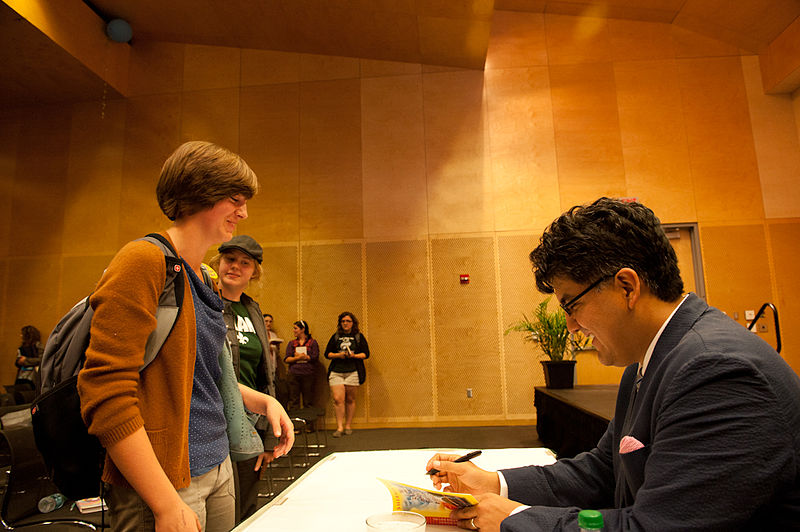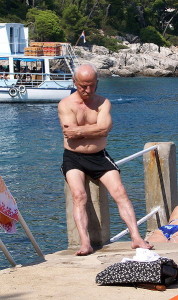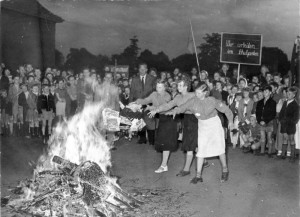A Name No Poet Could Shame
MARIA ‘YELLOW FANG’ WEISENSTEIN
There seems to be a widening window for white male writers who wish to publish their crummy-to-decent poems and short stories by publishing under more lively, culturally-vibrant monikers. It’s a window through which you can peek, or take a headlong dive.
In a small corner of the web Sherman Alexie, the controversial Native American writer, was kicking up dust after he’d accepted a poem from a white man who had attached a Chinese name to his work after he’d been rejected forty times under his true, mundane name.
Which was Michael Derrick Hudson. A name, in terms of striking modern cultural oohing and ahhing among publishers, is not much better than being called Bob Johnson, but is still quite a bit better than Dustin Wiener (and I do know a few Wieners; it’s a prestigious name, especially in Vienna).
The name which stirred Sherman Alexie? Yi-Fen Chou.

Credit: Tulane PR
Alexie latched on to the poem with the Chinese-named author, but then flipped over the tables in the editors station and tried not to punch the walls when he learned the poem was actually not as good as he’d thought. Or, what he’d learned, was the poem was not written by a brown-skinned man, like he’d thought.
Alexie called the identity misrepresentation “colonial theft”.
He’s not wrong, but at the same time, a writer’s a writer, and a poet’s a poet, and we’re all seeking homes for our most treasured works. If work from non-whites is most trendy this decade, then we whities will hit it hard while the iron’s hot. But hitting it hard is not as effective as hitting it right. The strike of a goldsmith is worth one hundred strikes of a blacksmith.
May the Bob Johnsons of the world understand that as well as Michael Derrick Hudson does.
At first blush, I chose the name Adam “Young Fang” Luebke. I’d read Black Elk Speaks, after all, and about that fecund culture of religion and thought that was stomped into the prairie by Long Hair and an endless stream of felon whites who had nothing better to do after the Civil War but go out fox-trotting after the ‘damned Indians’.
Believe me, I was rooting against Custer, even if I did draw inspiration from his hair and enduring saddle ass. But that doesn’t mean I feel guilty for coming out of the chute a Caucasian. Yet, I’m an opportunist when it comes to my writing.
 I wanted to throw a little indigenous pre-Columbus spirit into the mixture of my lily name, but then my mentor and exiled cultural philosopher Hubert Humdinger castigated me sharply.
I wanted to throw a little indigenous pre-Columbus spirit into the mixture of my lily name, but then my mentor and exiled cultural philosopher Hubert Humdinger castigated me sharply.
“Why do you half-ass everything you do?” he asked me. “Are you afraid somebody’s going to criticize you?”
“Of course not,” I said, “it’s just part of my nebulous modern American, video-game culture. Not that I play video games, but half-assing the real world is the best we’ll get from our society of people born in 1980 on up.”
Humdinger, who I was talking to over a shaky Skype connection, waved his hand so close to the camera he almost whipped it off its perch atop the computer. “Young Fang ain’t going to sell any stories. You got to go for the gold.”
He came up with a name for me that would stir the clotted hearts of literary magazine editors everywhere. “Maria,” he said first, because being a male is too threatening these days. Plus, with a woman, there is possible sex appeal where it counts. Disadvantaged female is even spicier for the big name editor types.”
Humdinger continued. “We’ll keep ‘Young Fang’, but change it to ‘Yellow Fang’ for a more seasoned approach, and to throw in that exotic vibe of modern day Western guilt and stereotypical intrigue. It’ll give the impression you’ve chewed through the literary canon, and you weren’t impressed by the bald white heads that put pen to paper throughout Western history.
“Then,” he finished saying, “I’d cap it off with a name to ring the right tune in the ears of most entertainment and media executives.”
The old philosopher opened his arms wide and said, “You will now write as Maria ‘Yellow Fang’ Weisenstein.”
“Should I say I’m homeless, too? And marooned on the streets of Los Angeles?” I asked.
Humdinger shook his head. “Don’t get carried away. The bleeding hearts editing the literary magazines aren’t that concerned about inequality.”
You might wonder why I would take writing advice from an unknown, exiled philosopher, but if you do your research, you’ll find Humdinger’s published more books than you, me, and John Creasey combined. In the late 70s, though, the US State Department torched every last copy of Humdinger’s work they could find. They paid folks $100 a piece, or handed out gift cards for Wienerschnitzel, in exchange for any Humdinger tome. It was like a modern day, Los Angeles gun buy-back program. Getting dangerous materials off the streets.
The books were tossed into a pit. Then a state official officially torched the suckers.
“Is that too intellectually dishonest?” I asked him. “Maria? I don’t identify as a woman. I don’t want BuzzFeed coming down hard on me. This could make their staff writers sick to their stomachs.”
Humdinger scoffed so hard he almost cleaned out the mucus in his nasal passages. “In 2015, can you even define anymore, in the world of writing and art, intellectual honesty? I haven’t seen an abundance of American intellectual honesty since Moby Dick was written.”
The cultural thought-stirrer explained to me that the best way to be published in modern America is to appeal to the underprivileged, gender-sensitive crowd who are still plowing through Howard Zinn’s history of America ten years after they’d started.
“It’s the milk and coffee crowd,” Humdinger said. “Nail ’em with a poem. Hit ’em with a blog post. Blast ’em with a short story sopping with sentiment. Tell ’em how you hang wet clothes out on the line and think of better days. And sign it Maria ‘Yellow Fang’ Weisenstein. Who knows? Maybe they’ll think you’re not even a citizen, but in the US illegally and keeping your head down. Any crusading editor who makes a hero of your work will also get a notch in his bedstand for being an activist.”
Humdinger signed off with, “You got to pitch them a disguised softball so they feel like they hit it out of the park.”
I said goodnight to my mentor and thought about taking his advice.
Surely Sherman Alexie would take any story under that name.
[office photo in public domain, courtesy of Covert via LSU Digital Library, Louisiana State Museum; Sherman Alexie photo from Tulane Public Relations]



There are no comments at the moment, do you want to add one?
Write a comment